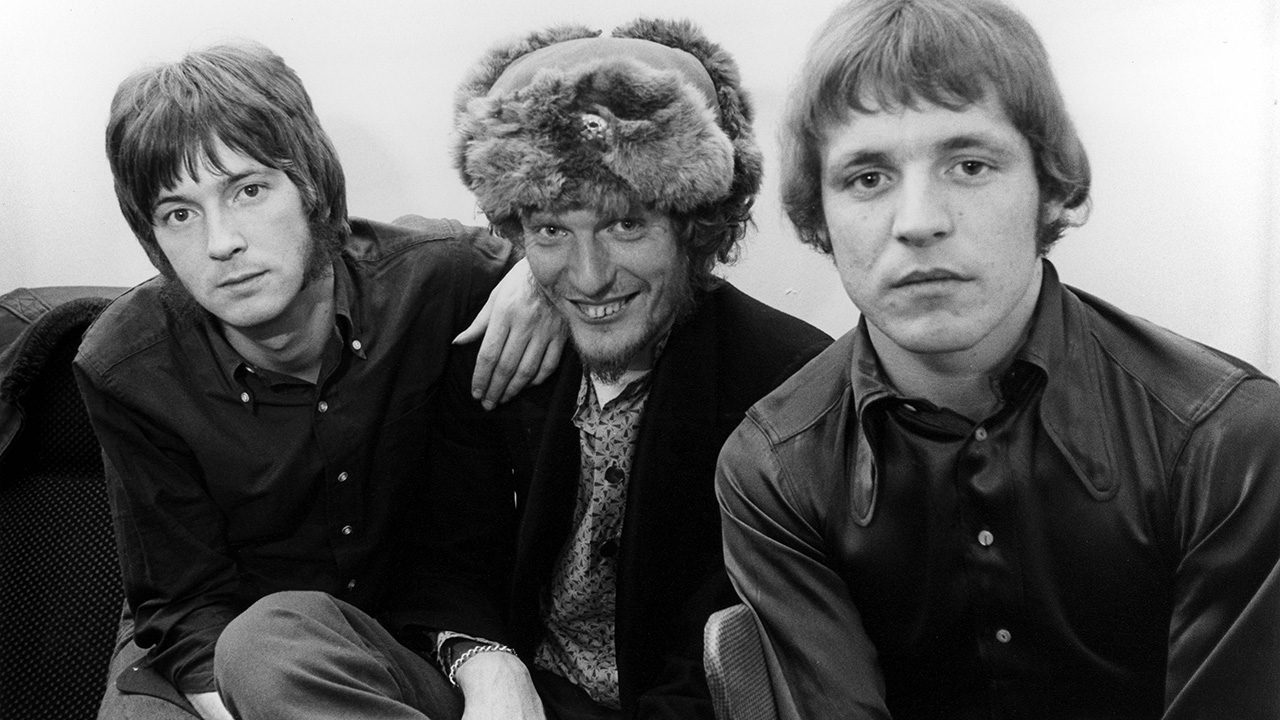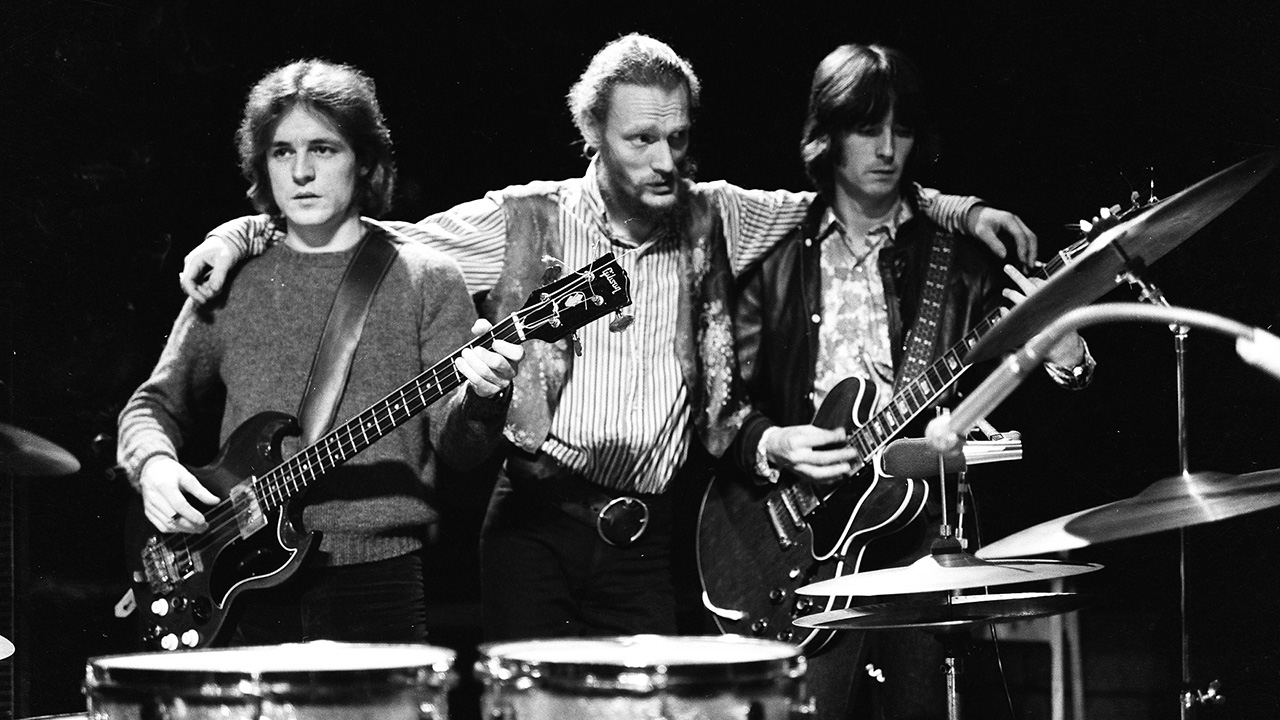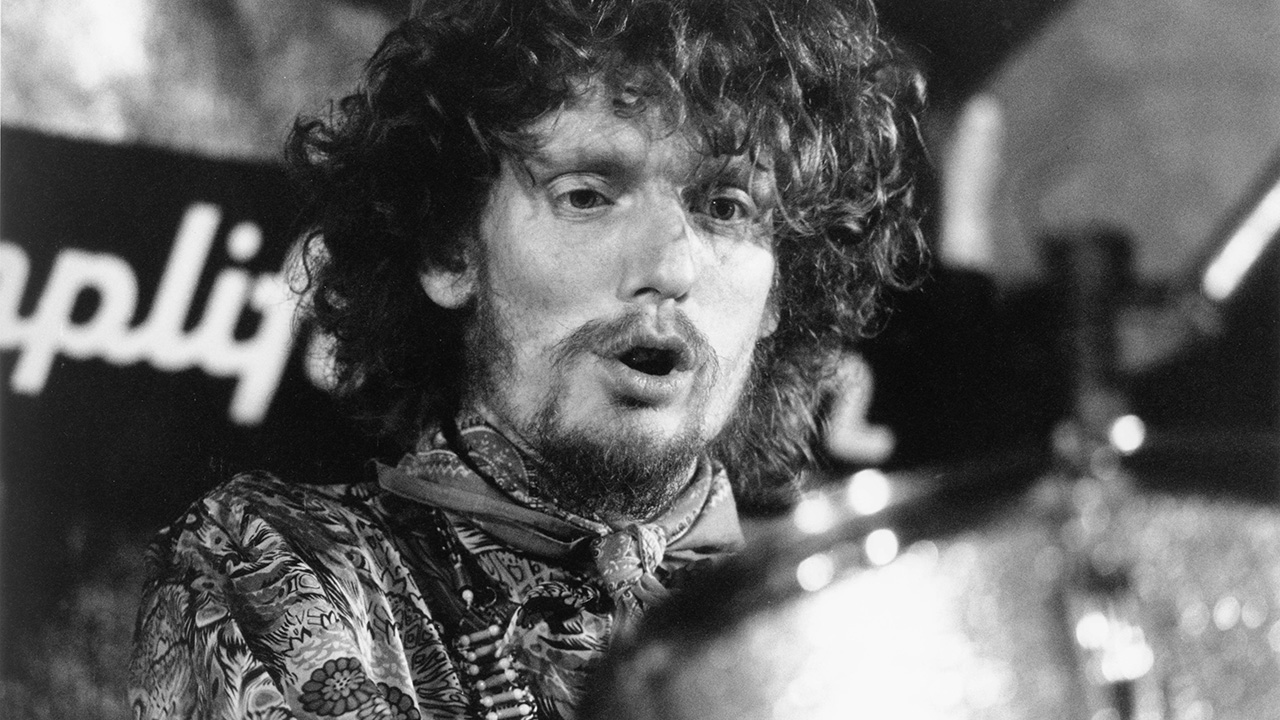Cream drummer Ginger Baker has died at the age of 80.
The news was confirmed on his Facebook page, with a statement reporting that he died peacefully earlier this morning.
The message reads: “We are very sad to say that Ginger has passed away peacefully this morning. Thank you to everyone for your kind words to us all over the past weeks.”
The drummer was admitted to hospital late last month, with his family saying at the time that he was in a critical condition. Last week they checked in to let fans know that he was “holding his own.”
No cause of death has been made public.
Baker had suffered ill health in recent years, and was forced to cancel a number of live shows in February 2016 after a fall and being diagnosed with a serious heart condition which required surgery.
He later thanked doctors and was back playing again at the Jack Bruce charity fundraising concert in London in the October of that year.
Baker was one of the most formidable musicians of the rock era, or indeed any era. A towering presence, both physically and musically, he elevated the role of drummer from sideman to star with monumental solos that combined polyrhythmic dexterity with brute force and irrepressible showmanship.
Together with his comrades in Cream – guitarist Eric Clapton and bassist Jack Bruce – Baker redefined the parameters of the emergent rock genre, importing the heavy dynamics and highly-skilled improvisational metrics of jazz and blues into a world that had previously revolved around the basics of the three-minute pop song.
As well as early stints with Blues Incorporated, the Graham Bond Organisation and John Mayall’s Bluesbreakers, Baker also co-founded the post-Cream supergroup Blind Faith and led his own bands Ginger Baker’s Airforce and the Baker Gurvitz Army.
He added his signature tom-tom-driven sound to rock bands ranging from Masters Of Reality and Hawkwind to John Lydon’s Public Image Limited. And, as a percussionist whose genius crossed geographical and cultural boundaries, he recorded with a host of latterday jazz warriors including guitarist Bill Frisell, trumpeter Ron Miles, saxophonist Pee Wee Ellis and many others.
He was born Peter Edward Baker in Lewisham, south London on August 19, 1939, later acquiring the childhood nickname Ginger on account of his thatch of fiery red hair.
He grew up in thrall to jazz music, and was a fan in particular of Phil Seaman, one of the great English jazz drummers of the post-war years, who became his teacher and mentor.
Baker got his first paid gig at 16 years old and passed through the ranks of trad jazz bands led by Acker Bilk, Terry Lightfoot and Ronnie Scott before replacing Charlie Watts in Alexis Korner’s Blues Incorporated in 1962. Amid the ever-changing line-up of Blues Incorporated, Baker played with bass player Jack Bruce and organist/saxophonist Graham Bond. The three of them, together with saxophonist Dick Heckstall-Smith, formed the groundbreaking jazz/r&b crossover band the Graham Bond Organisation in 1963.

“It was uncharted territory,” said Red Hot Chili Peppers drummer Chad Smith. “Ginger was a jazz guy. Charlie Watts told me that Ginger Baker was by far the best jazz drummer in England.”
A brief engagement in John Mayall’s Bluesbreakers brought Baker and Clapton together, and the decision to form a trio with Bruce came into formal effect when Cream played their first gig at the Twisted Wheel in Manchester on July 29, 1966.
The band’s debut album Fresh Cream was released in December 1966, ushering a new era of advanced musicianship into a scene that had hitherto been dominated by the elementary aesthetic of the beat group. In particular, Baker’s composition Toad, which closed the album, introduced the concept of the extended, virtuoso drum solo to the world of rock and roll.
Baker revolutionised the art of rock drumming. He was one of the first to use a double-bass drum set-up – along with Keith Moon of the Who – and to further expand the traditional kit with additional rack and floor toms and a plethora of crash, ride and splash cymbals. His style was visceral and powerful but also innovative and immensely creative, and his use of heavy, log-rolling tom tom patterns to underpin songs such as Sunshine Of Your Love and We’re Going Wrong was a revelation.
He also contributed to the writing, with songs such as Sweet Wine, Those Were the Days and Passing The Time, and in a group with two such imposing singers as Clapton and Bruce, Baker nevertheless managed to muscle in with his cockney growl leading the way on several numbers including Pressed Rat And Warthog and Blue Condition.
Cream’s work rate and speed of success was phenomenal. Within a year they had gone to America, where they recorded their second album, Disraeli Gears, with artwork and lyrics which remain a benchmark of the psychedelic era. Within two years they had become one of the biggest touring attractions in the world and recorded their third album, Wheels Of Fire. And after just 27 months they split up after two farewell shows at the Albert Hall in November 1968, leaving a legacy which influenced and inspired a generation of bands from Led Zeppelin, Deep Purple and Black Sabbath onwards.
Not that Baker was bothered about any of that. “I’ve seen where Cream is sort of held responsible for the birth of heavy metal. Well, I would definitely go for aborting. I loathe and detest heavy metal. I think it is an abortion,” he once told Forbes magazine.
“A lot of these guys come up and say, ‘Man, you were my influence, the way you thrashed the drums.’ They don’t seem to understand I was thrashing in order to hear what I was playing. It was anger, not enjoyment – and painful. I suffered on stage because of that volume crap. I didn’t like it then, and like it even less now.”

Baker and Clapton quickly joined forces with singer, guitarist and keyboard player Steve Winwood and bass player Rick Grech to form Blind Faith. Hailed as an instant “supergroup”, the band played its debut show in June 1969 in front of 100,000 people in Hyde Park.
They released an eponymous album, which topped the US and UK charts. But the impossible expectations which accompanied the band’s rapid ascent to such dizzying heights, was all too much and after one, brief US tour, Blind Faith split up in August 1969, having been publicly active for all of three months.
Baker immediately recruited Winwood and Grech as the core of his own jazz-rock supergroup Ginger Baker’s Airforce which toured and released two albums featuring a vast and rapidly-fluctuating roll call of contributors including his old colleagues Phil Seaman and Graham Bond.
Baker moved to Africa in the 1970s, where he worked with musicians including the Afrobeat star Fela Kuti and set up a commercial recording facility, Batakota Studios in Lagos, Nigeria. He ranged freely across continents and musical genres in the decades that followed, recording a bunch of sublime jazz albums with his own bands – notably Middle Passage (1990) and Coward Of The County (Ginger Baker and the DJQ20, 1996) - and lending his considerable weight to various rock projects including a short-lived power trio with Jack Bruce and guitarist Gary Moore BBM which released one album, Around the Next Dream in 1994.
Away from the music world, he became a dedicated polo player and set up his own stables and polo club in Western Cape, South Africa. A documentary by the American film maker Jay Bulger, Beware of Mr Baker (2012), portrayed him as a reclusive and cantankerous character, an impression which his bracingly direct memoirs Hellraiser: The Autobiography of the World’s Greatest Drummer (2010) did little to dispel. In it, he wrote candidly about his years of heroin addiction which began in 1960 and continued on and off until the 1980s.
In later years he suffered innumerable health issues including degenerative osteoarthritis and chronic obstructive pulmonary disease, the result of years of heavy smoking. He was married four times and leaves behind three children Nettie, Leda and Kofi.
Cream were inducted into The Rock and Roll Hall of Fame in 1993, when they played together for the first time in 25 years. But it was the string of Cream reunion shows at the Albert Hall, London and Madison Square Gardens, New York in 2005 which marked the most fitting memorial to this colossus of the kit.
The London shows ended with Baker once again performing his showcase number Toad. Looking like an ageing gangster, and playing with an air of super-relaxed menace, his hands were seemingly guided by his huge sticks rather than the other way round. With Clapton and Bruce standing admiringly at either side as he hammered the heads, his status as one of the original rock superheroes was sealed beyond any shadow of doubt.
“I’ve had loads of high points and loads of low points,” he told Classic Rock. “Where a lot of people would have topped themselves, I kept going. Being from a very poor background, you can handle that. Getting to know people I really admired and getting accepted and respected by them is a highlight.
Guys like Phil Seaman, Art Blakey, Elvin Jones, Max Roach – all these people became friends of mine, and I was accepted by them on the same plane. That was worth more than all of the money in the world.”

